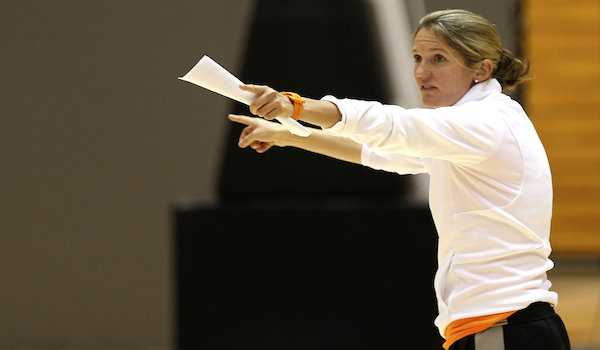In 2015, Forbes named Princeton Head Coach Courtney Banghart as one of the World’s 50 Greatest Leaders. This well-deserved honor was a result of building the Princeton program into a consistent winner on a national level, while ensuring her student-athletes met the daily rigorous academic standards of the country’s top University.Over the past eight seasons, Banghart has led Princeton to 187 wins and five Ivy League Championships, as well as the program’s first-ever NCAA Tournament berth in 2010. She has accomplished a tremendous amount of success, all while having fun doing so.
What would you suggest three priorities be for a first-time Head Coach once taking over a program?
In order of importance, the three biggest priorities are.One, Remember that you were given the job because of who you are, which is and will always be, much more than what you’ve already done. Trust your preparedness, trust your instincts, and be willing to work very hard. Smile. Celebrate the good times. Learn from the mistakes. Just as you ask your players to, come back better every season. Understand that competency is picked up along the way, you’re not expected to know it all on the way in.
There’s no way to fully prepare to be a first-time Head Coach, just as there’s not only one way to do it. So stop over-thinking things. Trust yourself and commit to enjoying the journey.
Two, You always win with people. First off, hire to fill your holes, not to simply fill your staff page with credentials. You will lean on your staff in so many ways, make absolutely sure they are people who will make you better. Then invest in their development on your staff.
In regards to your players, commit fully to them. Care more about who they are, than what they do for you. Ask questions and care about the answers. Teach rather than dictate. The game is over-coached, and under-taught. Teach your players how to compete, how to treat one another, how to put in the work, and how to trust the process. Along the way, they’ll learn to pass away from the defense and to find the open guy. Most of all in regards to people, lead with authenticity and clarity.
Lastly, understand how important it is to find support around you, including those that will tell you the truth, those that will pick you up when you need it, and those that will share in the good and the bad. The best leaders share their journey.
Three, work really hard and have fun. Always remember that your team will follow your lead and they will play to the personality of its leader (you). There’s something really special about building a program. Enjoy the process! Very few jobs are great jobs on the way in, but you’ll make it great. It will take time. Build the foundation, trust that the score will take care of itself.
What strategies have you implemented since you arrived on campus 11 seasons ago in rebuilding a Princeton program and making it competitive on a national level?
I’ve hired really good people. That’s a non-negotiable.
I’ve recruited people I want to coach, not just talent that I’d like to have on my roster.
I care deeply about team, but I always coach the individual pieces. I don’t let the parts get lost in the whole.
I bring my authentic self to every conversation and interaction.
I obsess on practice planning. Practice is where you put value into what you emphasize and what you allow.
I dare to be great, respecting the challenges, but committed to growth, with consistency and optimism every day.
Finally, I’ve always committed to scheduling the most challenging opponents I can. I learn the most in competitive opportunities, not in easy wins. I understand that trust is built by doing something difficult together. And my team understands where I think we can be, by who I schedule in the non-conference.
What advice do you have for coaches to best delegate to their staff?
Hire good people. And then trust them. If you want your staff to own their responsibilities, give them the freedom and ownership to do them well. Understand the difference between delegation and collaboration. There is a time and place for each.
Everyone operates best when given clarity. Be willing to say the hard things, the easy things, and the important things. Speak up and listen well.
Ask them what they are best at, and work to keep them in their zone of genius. Notice where they have holes. Nudge them forward, ensuring there are growing along with your program.
Knowing what you know now as a very successful Head Coach, what are a few ways assistant coaches can best prepare to lead their own program for the first time?
Honestly, it’s impossible to prepare for your first head coaching job, just as it was impossible to prepare for your first assistant coaching job. Remember that you took the leap, and you worked hard to get better. It’s the same thing in this case. Get the job you’re excited about, trust yourself, invest in the people around you, and have fun. Hire well, be authentic, and learn from mistakes. Don’t take yourself too seriously. The more in tune you are to your responsibilities as an assistant, the better boss you’ll be to your staff. Most of all, realize that the Head Coach is only one such role on the team. The best teams need all types of roles and yours is no more or less important than anyone else.

